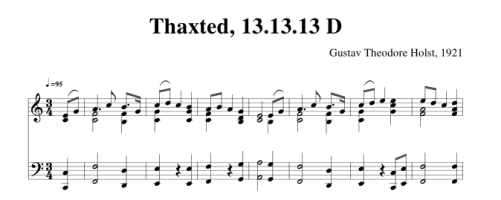I first heard the hymn “I Vow to Thee, My Country” while watching the first season of The Crown [1]. I assume the hymn is familiar in the UK, but it is not in America as far as I know.
When I say I first heard the hymn, I mean that I first heard it as a hymn with words. I thought the tune sounded familiar, and that it reminded me of The Planets by Holst.
I’ve started watching the latest season of The Crown and once again I heard the hymn [2], so this time I looked into it more. The tune does indeed come from The Planets, specifically from the middle of the Jupiter movement.
With a little searching I found the sheet music to the hymn.

This brought up more things I’ve long meant to look into. As a child I remember cryptic notations around hymns, such as “Thaxted 13.13.13 D” above, and never knew what they meant.
Tunes have names independent of the hymns they appear in, but these tune names were, and still are, completely unfamiliar to me. For example, the hymn “Amazing Grace” has the tune “McIntosh,” though I don’t imagine many people know that.
In the example here, “Thaxted” is the name of the melody from Jupiter when it is used as a hymn. The name comes from the English town of Thaxted where Holst lived. Perhaps there are other hymns that use the same tune.
Now what about the mysterious numbers 13.13.13? They mean that the hymn is built out of groups of three lines, each with 13 syllables. The hymn Once in Royal David’s City is marked 87 87 77, meaning the hymn has three phrases, the first two alternating lines of 8 and 7 syllables, and the last having two lines of 7 syllables each.
From what I’ve read, the “D” in “13.13.13 D” stands for double meter, which I would take to mean 2/4, but the tune is clearly in 3/4, so I’m not sure what the D means.
Update: The D means the entire pattern is doubled, not that the meter is double time. Thaxted has six lines, in two groups of three. Thanks to Michael Lugo for letting me know via Twitter.
***
[1] S1E1 10:00
[2] S4E3 40:30

This tune was also used for the song “World in Union” which is the theme song of the Rugby World Cup since 1991. But probably only your international readers would know or care about rugby union :)
Another hymn that uses that tune is “O God beyond all praising”. If you have a particular interest in hymns then hymnary.org is a great resource.
Mixing and matching tunes and lyrics is common in the shape note singing tradition, so the meter notation helps. Sacred Harp, the most common shape note book, has an index by first lines: some lyrics have up to four different tunes. The lyrics to Amazing Grace appear twice, with the tunes New Britain (similar to the tune everyone’s familiar with, but arranged very differently) and Jewett.
As I sit here typing, just out of reach of my left hand is a shelf with 18 different hymnals (including the Liber usualis and the 1906 English Hymnal for which Holst’s friend Ralph Vaughan Williams commissioned him to write “In the bleak mid-winter” (Cranfield)). No two of them agree on much of anything, except a handful of the most familiar tunes.
Unfortunately, learning words to an existing purely instrumental tune is a trapdoor function — you can never go back psychologically and hear the music as if you didn’t know the words. For many people, this permanently impairs their enjoyment of the instrumental original. I have deliberately avoided exposure to “I Vow to Thee My Country” for that reason, but I was unable to avoid being tainted by a setting of the main theme from the 4th movement of Brahms’s 1st Symphony, and by the silly ditty set to the main theme from Schubert’s 8th.
The hymnal I was most familiar with as a child was indexed at the back by title, first line, tune name, meter, and subject/season. The index by meter was interesting in part because of the very skewed frequency distribution. The index by tune name was interesting because it was the first place I encountered significant amounts of Welsh — tune names like “Cwm Rhondda” and “Bryn Calfaria” and “Ar Hyd y Nos” and “Aberystwyth”.
@David Tate:
1. Whatever you do, do not ask a clarinettist for the words to the beginning of Brahms’s E-flat sonata.
2. Any/all English prose, but especially corporate training materials, can be sung to “The Church’s One Foundation”.
3. Check out my web site, you’re just liable to find something you like.